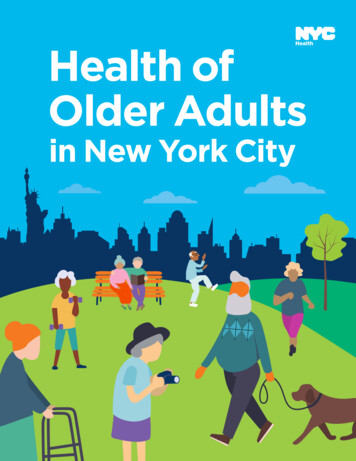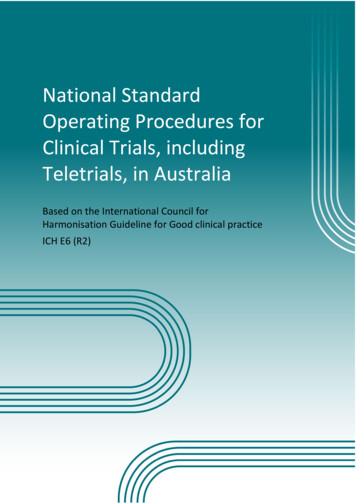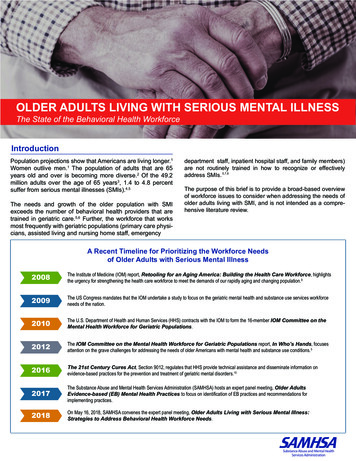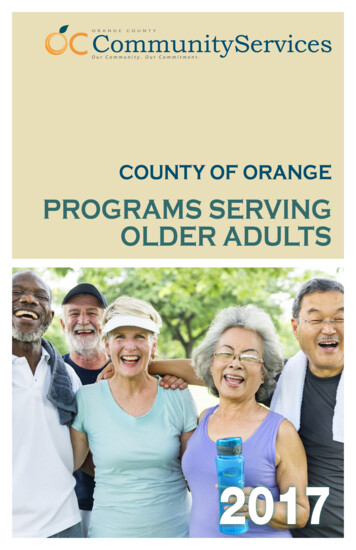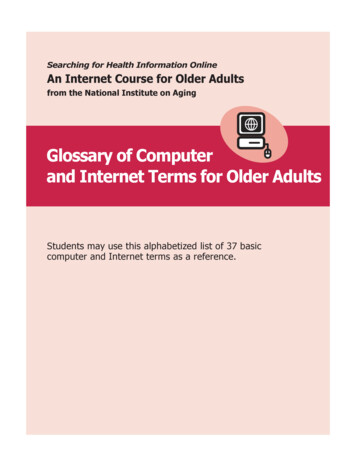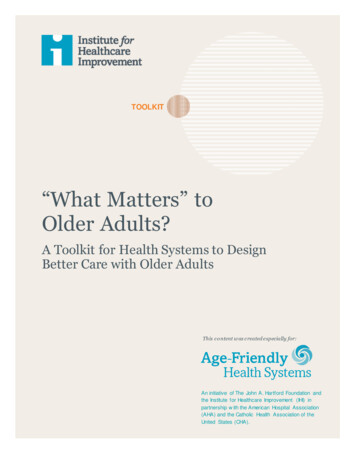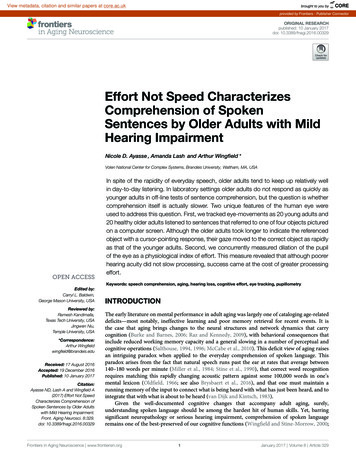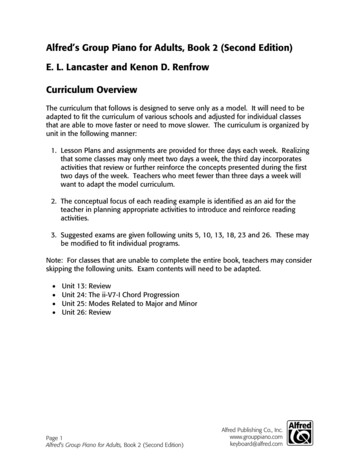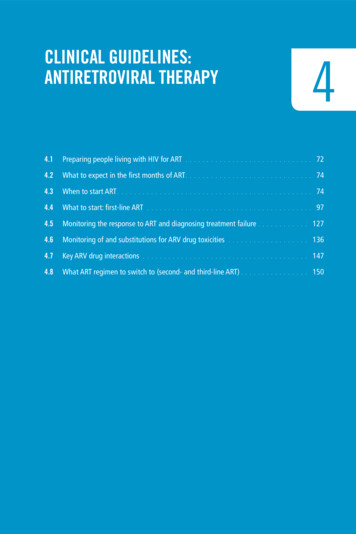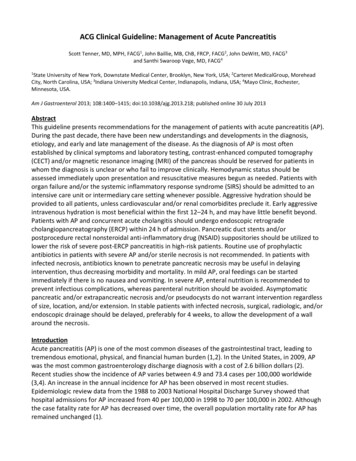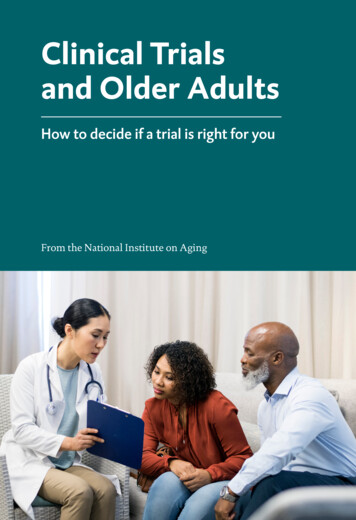
Transcription
Clinical Trialsand Older AdultsHow to decide if a trial is right for youFrom the National Institute on Agingi
Table of ContentsWhat’s inside1What is a clinical trial?3Why consider a clinical trial?5Where can you find a clinical trial?6What happens in a clinical trial?7Why is it important for everyone to beincluded in clinical trials?10What are the benefits and risks ofa clinical trial?12How your safety and privacy will be protected14For more information16Words to know
By joining clinical trials, older adults may help doctors find newtreatments.iv
What’s insideClinical trials have led to all the medicines and treatments weuse today. Doctors need older adults to join their clinical trialsso they can learn more about how new treatments will work forolder people. Use this booklet to help you decide if taking partin a clinical trial is right for you, a friend, or a family member.This booklet will help you learn: What a clinical trial is Reasons why people take part in a clinical trial How to find a clinical trial Benefits and risks of a clinical trialTips about using this bookletUse the Table of Contents to help you find things quickly.Some medical terms, such as placebo, are in bold. You canfind how to say these words and what they mean in the“Words to know” section on page 18.1
James’s storyJames is 73 years old and just found out that he hasAlzheimer’s disease. He and his wife, Alice, are worriedabout how it will change their daily lives. Will he forgetto take his medicine? Will he forget his favorite memoriesor people he knows? When James and Alice talked tohis doctor about their concerns, she told them about aclinical trial that is testing a possible new treatment forAlzheimer’s. Alice will be part of the trial, too, as James’sstudy partner.2
What is a clinical trial?Like James, you might have heard of clinical trials but may not besure what they are or if you want to join one. This booklet givesyou information about clinical trials and can help you decide iftaking part in one is right for you.A clinical trial is a type of research study that involves people.Most clinical trials test a new treatment for a health problem,like a new drug, diet, or medical device (for example, apacemaker for your heart). Clinical trials help doctors learn if anew treatment is better, the same, or worse than normal care.Other clinical trials test ways to prevent a disease or find itearly. Most medicines that people use today have been tested inclinical trials.Before the Federal Government can approve a medicine orother treatment for people, it must be tested to make sureit is safe and it works. Sometimes, treatments are tested inanimals first. Then, doctors run clinical trials with people tofind out what happens when they get the new treatment.In many clinical trials, doctors compare two groups of people.One group of volunteers will get the new treatment beingtested. The other group of volunteers will get a placebo (apill or other treatment with no medicine in it). A computerdecides which group a volunteer will be in. This is calledrandomization. In many trials, no one—not even yourdoctor—knows who gets the treatment or the placebo.3
Ana’s storyAna is 80 years old. She has been feeling weak and fallinga lot. She tried different medicines, but they did notwork well. She asked her doctor if there were any newtreatments being tested in a clinical trial. Together, theyfound a clinical trial that was right for her.Being in a clinical trial means Ana gets to talk withmedical experts and learn more about her condition. Shedoes not know if she is getting the new treatment or theplacebo. But Ana is glad she gets medical care and hasregular check-ups for her health condition. Plus, she feelsgood knowing she is doing something that might help herchildren and grandchildren in the future.4
Why consider a clinical trial?There are many reasons why people choose to join a clinicaltrial. Some join a trial because there is no other treatment fortheir health problem or because the treatments they tried didnot work. By being part of a clinical trial, people may helpdoctors find new treatments. Some people who are healthymay also join studies to help find ways to prevent a disease,such as one that may be common in their family.Healthy people may join a clinical trial to help find ways to preventa disease.5
Where can you find a clinicaltrial?There are many ways to find a clinical trial that might be rightfor you. You can: Ask your doctor to help you find trials in your area. Sign up for a registry or a matching service to connect youwith trials in your area. Search the National Institutes of Health websitewww.ClinicalTrials.gov.Support groups and websites that focus on a specific healthproblem sometimes list clinical trials. You may also see adsfor trials in your area in the newspaper or on TV.You can find clinical trials on the National Institutes of Healthwebsite at www.ClinicalTrials.gov.6
What happens in a clinical trial?Once you find a trial you are interested in, talk with yourregular doctor. Next, contact the study team that runs thetrial in your area and talk to the study coordinator. You canusually find this contact information in the details about thestudy. The study coordinator will ask a few questions to seeif you match the type of person they are looking for. He orshe will ask about your age, sex, type and stage of disease,function, and other health problems.If you match, you will be invited to visit the study site tolearn more. During this informed consent process, thestudy team will explain the purpose of the study and thepossible risks and benefits to you if you choose to join. Youwill learn everything that will happen during the study andA study coordinator can answer your questions about a clinical trial.You will sign a consent form if you decide to join.7
what you will need to do, such as how many times you willvisit the study site and any tests you will take. The studyteam will answer all your questions to help you decidewhether or not you want to join the trial.If you decide to join, you will sign a consent form. It meansthat you understand what will happen during the study andthat you want to be part of it. Even after you sign up for thestudy, you can choose to stop participating at any time.While participating in the study, you will visit the study siteregularly to get tests and make sure you are doing well.Make sure to tell your regular doctor if you are thinking aboutjoining a clinical trial. He or she may want to talk to the studyteam to make sure the trial is safe for you and to coordinateyour care while you are in the trial.Once you find a clinical trial you want to join, talk with your doctor.8
Questions to ask before participating ina clinical trialHere are some questions you may have about joining aclinical trial. Write down your questions and bring the listwhen you first meet with the research team.1.What is this study trying to find out?2.What will I have to do?3.What treatment or tests will I have? Will they hurt?Can I get the treatment after I finish the study?4.What are the chances I will get the new treatment?5.What are the possible risks, side effects, andbenefits of the study treatment compared with mycurrent treatment? What other options are available?6.How could being in this study affect my daily life?7.How long will the clinical trial last?8.Will there be any travel or other costs to considerwhile I am in the trial? If so, can you cover any ofthese expenses?9.Where will the study take place? Will I have to stayin the hospital?10. Will you provide a way for me to get to the studysite if I need it?11. Will you tell me the results of the study? How willI be told?12.9
Why is it important foreveryone to be included inclinical trials?It is important for clinical trials to have people of differentages, sexes, races, cultures, and health conditions. A drug,device, or other treatment may work differently in one groupthan in another. Having different groups of people take parthelps doctors know if the treatment works for everyone.Many older people have special health needs that are differentfrom those of younger people. For example, as people age, theirbodies may react differently to drugs. Older adults may needdifferent doses of a drug to work well. Also, some drugs mayhave different side effects in older people than younger people.Researchers know that it can be hard for some older people tojoin a clinical trial. Talk to the researchers if you have any ofthese concerns: If you have many health problems, can you join a trial thatis looking at only one problem? If you are frail or disabled, will you be strong enough totake part? If you no longer drive, how can you get to the study site?The research team may have a plan to make it easier for you totake part in the trial.10
Mark’s storyMark is 67 years old and has heart disease. He is not sureabout clinical trials. He does not want to feel like a lab rat ortake the chance of getting a placebo or a treatment that maynot work or makes him feel worse. His doctor talked withMark about clinical trials—what they are, how they work,and why they need volunteers. She explained that thereare both risks and benefits of clinical trials and describedhow people who volunteer for trials are protected. Thisinformation helped Mark feel better about clinical trials.He plans to learn more about how to join a trial.11
What are the benefits and risksof a clinical trial?You may wonder, “Why should I try something researchersare not sure will work?” That is a good question. Being part ofa clinical trial may have risks, but it may also have benefits.Benefits of a clinical trial You may get a new treatment for a disease before it isavailable to everyone. You may help others get a better treatment for their healthproblems in the future. You play a more active role in your own health care. You can help researchers find new ways to prevent, detect,and treat diseases.Risks of a clinical trial The new treatment may cause side effects or may beuncomfortable. The new treatment may not work, or it may not be betterthan normal care. For randomized studies, you may NOT be part of thetreatment group that gets the new treatment. Instead, youmay be part of the control group, which means you get thenormal treatment or no treatment (a placebo). The clinical trial could take time, or you may need to travelto the study site several times.12
Lian’s storyLian is 68 years old. She is often very sick and in a lot ofpain, but her medicine has stopped working for her. Hersister told her about a study testing a new medicine.Lian contacted the study. After answering some questions,she found out that she was a good match for the study.But, she was concerned about her safety and privacy andthe treatment she would get. A person from the study satwith her to explain everything in detail and answer all ofher questions. Lian was so relieved. After that, she signeda form to show that she understood everything and agreedto take part in the study.13
How your safety and privacywill be protectedThe history of medical research is not perfect. Based on yearsof experience and learning, Congress has passed laws toprotect people who take part in clinical trials. Today, everyinvestigator must follow strict rules to make sure that everyperson in a clinical trial is safe. These rules are enforced bythe Federal Government. Also, each clinical trial follows acareful study plan (called a protocol) that describes exactlywhat the researchers will do.All clinical trials in the United States must be approved by anInstitutional Review Board, or IRB. The IRB is made up ofdoctors, scientists, and people like you who make sure thatrisks to people are as low as possible.The informed consent process also helps protect peoplewho volunteer for trials by making sure they understandeverything about the trial they are joining.Federal rules protect the safety of participants in clinical trials.14
If you are considering joining a trial, you have theright to: Learn about all the treatment options for yourhealth condition. Learn all that is involved in the trial, includingdetails about treatment, tests, and possible risksand benefits. Discuss the trial with the study doctor andstudy team. Hear and read the information in language youcan understand. After discussing the study with you, theresearch team will give you an informed consentform to read. The form includes written detailsabout the information that was discussed withyou and describes the privacy of your medicalrecords. If you agree to take part in the trial, yousign the form. Even after you sign the consent form, you canleave the trial at any time. You can always askquestions. And the study team will tell youabout new information as it becomes available.15
For more informationThe following groups can help you learn more about clinicaltrials and search for clinical trials that may be right for you.General informationNational Institutes of Health (NIH)NIH Clinical Research Trials and s.gov(searchable online database of trials and studies)U.S. Food and Drug Administration (FDA)1-888-463-6332 gov/ForPatients/ClinicalTrials/default.htmMatching services and tching-services16
Alzheimer’s and related dementias researchAlzheimer’s and related Dementias Education and Referral(ADEAR) Center1-800-438-4380 (toll-free)adear@nia.nih.govwww.alzheimers.govFind Alzheimer’s disease and related dementias clinical ind Alzheimer’s disease research research-centersTo learn more about health and aging:National Institute on Aging Information Center1-800-222-2225 (toll-free)1-800-222-4225 it www.nia.nih.gov/health to find more health and aginginformation from NIA and subscribe to email alerts. Visithttps://order.nia.nih.gov to order free print publications.Share this booklet with friends and family so they can learnabout clinical research and participating in clinical trials.17
Words to knowControl group(pronounced kun-TROLE groop)The group of people who get the placebo or normal treatmentor no treatment at all. Not all clinical trials have a control group.Informed consent(pronounced in-FORMD kun-SENT)Before a person agrees to take part in a clinical trial, researchersexplain the details—what the study is trying to find out, howlong it will last, what will happen, and possible benefits andrisks. You sign a form showing that you understand what willhappen during the study and want to be part of it.Investigator(pronounced in-VES-tih-gay-ter)A researcher who works on a clinical trial. The lead researcherfor a study is called the principal investigator.Placebo(pronounced pluh-SEE-boh)A pill or other treatment that looks like the treatment ordrug being tested but has no medicine in it. A placebo issometimes called a “sugar pill.” Researchers often comparewhat happens to people using the study treatment with whathappens to those taking the placebo.18
Protocol(pronounced PROH-tuh-KOL)A detailed study plan that answers specific researchquestions and protects people. The protocol describes thetype of people who can take part in the study, the teststhey will receive, how long the study will last, and howresearchers will determine the benefits and risks.Randomization(pronounced RAN-duh-mih-ZAY-shun)The process of assigning people to different groups in aclinical trial. Participants are assigned by chance (like the flipof a coin). A computer is usually used to assign people to agroup. Neither participants nor doctors can pick which groupa person is assigned to.Side effects(pronounced side eh-FEKTZ)Bad effects caused by a treatment. Examples of common sideeffects are headache, nausea, and skin irritation. Sometimesside effects can be more serious, even life-threatening.Study coordinator(pronounced STUH-dee koh-AWR-din-ey-ter)The person you can contact with questions about the studyor your participation. Sometimes called the clinical researchcoordinator.Treatment group(pronounced TREET-ment groop)The group of people who get the treatment being tested in theclinical trial. Results from the treatment group are comparedwith those from the control group to see if the new treatmentis better and/or safer.19
NIH Publication No. 19-AG-8067May 2019
if you match the type of person they are looking for. He or she will ask about your age, sex, type and stage of disease, function, and other health problems. A study coordinator can answer your questions about a clinical trial. You will sign a consent form if you decide to join. If you match, you will be invited to visit the study site to learn .
